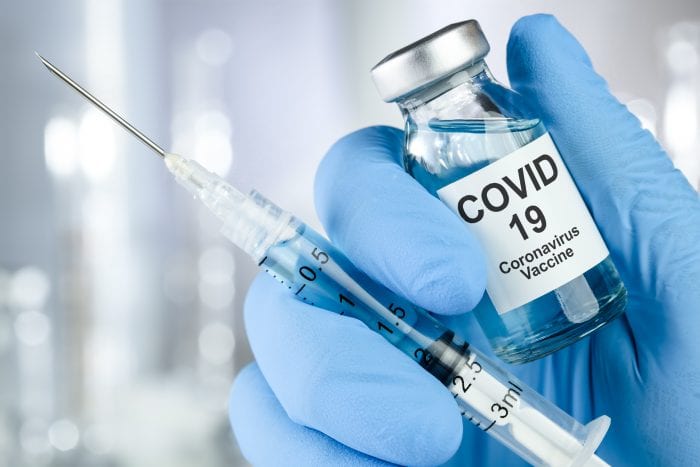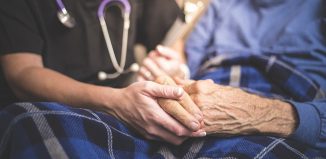Fauci disappointed with ‘counterproductive’ political response to COVID
Looking back on the response to the COVID-19 pandemic, Dr. Anthony Fauci, director of the National Institute of Allergy and Infectious Diseases, expressed his frustration with the reaction to recommended safety measures.
“Public health issues got entangled in the profound divisiveness in our society,” Fauci said in a public discussion with the College of William & Mary president, Katherine Rowe, last week. “When you’re dealing with a common enemy, which is the virus, it is very counterproductive to be divisive over virtually everything you do.”
Fauci was frustrated that wearing a mask became a political statement, calling that “ridiculous” and suggesting that it “accounted for a less-than-optimal response that this country had.”
“I believe we’re going to get there within this calendar year.”
— Dr. Anthony Fauci
The disagreements were based “not on facts and science, but on political differences,” he said. In the next year, however, Fauci expressed hope that the country would have the virus under control and that it would eventually no longer threaten public health.
“I believe we’re going to get there within this calendar year,” Fauci said on the William & Mary call. “The problem is that a global pandemic requires a global response and if we don’t participate as [have] the other developed nations in the EU and in the U.K. and Canada and Australia, if we don’t participate in a program, in COVAX, that helps provide vaccines for the developing world … our problem will never go away.”
Indeed, last week, President Joe Biden (D) pledged $4 billion to the COVAX program at the G7 meeting.
Fauci pushed an initial estimate back for the time when vaccines for the virus would be available broadly to the United States population.
“One of the disappointments, which made me change [the] estimate, the Johnson & Johnson vaccine, which we anticipated would be coming in significant quantities in March and April, we learned that they will not have significant quantities until likely May and June,” Fauci said.
Reacting to a question from William & Mary Student Assembly president, Anthony Joseph, Fauci said, “Somebody like yourself, a young person, will likely have to wait until May.”
In response to a question about whether a vaccinated individual could be a carrier for COVID-19, Fauci said it is a “theoretical possibility — how likely that is, we do not know.”
The vaccination might prevent someone from showing clinical signs of the disease, but it might not keep someone from being a carrier.
He recommends people who have received the vaccine continue to wear a mask when they’re in the presence of people who have not been vaccinated, to prevent the possibility of infecting someone else.
New York State vaccinations
Snowstorms throughout the country this winter have disrupted the process of distributing vaccines.
New York State Department of Health said facilities where people scheduled appointments will connect with them before and during storms.
“As has been the case for past postponements, if any vaccine appointments at state-run sites are impacted by winter weather, they will be rescheduled over the following seven days,” a DOH spokesman said in a statement. “New Yorkers with appointments scheduled will receive an email or text message to reschedule their vaccination.”
Each resident who received a first dose at a state-run site will get a reminder email 24 hours before their second dose appointment.
When residents of the Empire State receive their first shot, they are required to schedule a second dose during that appointment.
Anyone who missed their appointment for a second shot should contact the call center to reschedule, if possible.
The state is required to keep a second dose on hand up to 42 days after a first shot, even though people who receive the Pfizer vaccine should get their second dose three weeks after the first shot and those who get the Moderna vaccine should return four weeks later. After 42 days, the state site can give the vaccine to someone else.
New York State requires all providers to keep a daily list of standby eligible people, in the event that an appointment opens up.
“As soon as providers are aware that there are more doses than people to be vaccinated, standby eligible individuals should be called, or other steps must be taken to bring additional eligible recipients to the facility or clinic before the acceptable use period expires,” the Health Department said in a statement.
Recognizing that the vaccination process can go awry during storms, providers can administer the vaccine to other public facing employees if extra doses remain at the end of a clinic and no one from a priority population can arrive before the doses expire.
As an example, the DOH suggested that commercial pharmacists who had already vaccinated eligible residents can offer the vaccine to members of the pharmacy department, store clerks, cashiers, stock workers and delivery staff.
“This exception is only for the purpose of ensuring vaccine is not wasted,” the spokesman said.
In remarks on Feb. 9, Gov. Andrew Cuomo (D) indicated that the supply of vaccines continues to lag well behind the demand.
“We now have about 10 million New Yorkers waiting on 300,000 doses,” Cuomo said. “The supply will only increase when and if Johnson & Johnson is approved. The Pfizer and Moderna vaccines are ramping up but the ramp-up is relatively slow, so we won’t see a major supply increase from Pfizer and Moderna, nowhere near what we would need to make rapid progress against the 10 million.”
Stony Brook vaccinations
Stony Brook University, meanwhile, announced that it reached a milestone last week when it distributed its 25,000th vaccine, exactly a month after the site started administering the vaccine. That means the university has vaccinated more than one person per minute for each of the 11 hours it’s been providing shots.
In a statement, President Maurie McInnis said she was “proud of the milestone” and called the effort by the university and Stony Brook Medicine “excellent work.”
SBU Hospital is also assisting in developing point-of-distribution sites in underserved communities on Long Island.







